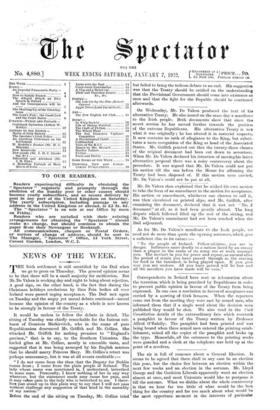It would be useless to follow the debate in detail.
The sitting of Tuesday was chiefly remarkable for the furious out- burst of Countess Markievitch, who in the name of pure Republicanism denounced l$Ir. Griffith and Mr. Collins. She attacked Mr. Griffith for making promises to " England's garrison," that is to say, to the Southern Unionists. She hurled gibes at Mr. Collins, mostly in execrable taste, and suggested that it was being arranged by his English masters that he should marry Princess Mary. Mr. Collins's retort was perhaps unnecessary, but it was at all events creditable :- " I do not come from the class that the Deputy for Dublin comes from ; I come from the plain people of Ireland. The lady whose name was mentioned is, I understand, betrothed to some man. Personally, I know nothing of her in any way whatever, but the statement made may cause her pain, and it may cause pain to the lady who is betrothed to me. I there- fore just stand up in this plain way to say that I will not pass without challenge any suggestion of that kind in the assembly of my nation."
Before the end of the sitting on Tuesday, Mr. Collins tried but failed to bring the tedious debate to an end. His suggestion was that the Treaty should be ratified on the understanding that the Provisional Government should come into existence at once and that the fight for the Republic should be continued afterwards.










































 Previous page
Previous page